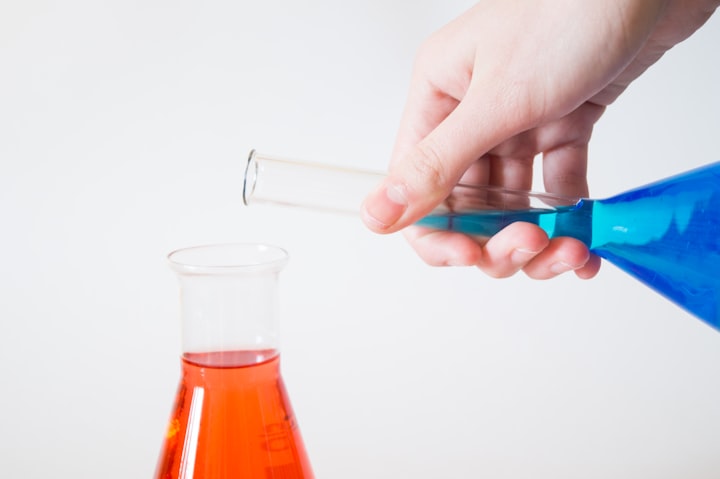What Is Chemistry
Chemistry- A Science Of Transformation

What Is Chemistry?
According to the ACS, chemistry is the study of matter , and the changes that matter can undergo when it is subject to different environments and conditions.
It’s Everywhere
"Everything you hear, see, smell, taste, and touch involves chemistry, and chemicals (matter)".
The field of chemistry involves every thing around us .Chemistry ought to be not for chemists alone, so even if you are not chemist, you're doing something that involves chemistry.
You do chemistry when you cook, wipe off your counter with detergents; take medicine or when you dilute concentrated juice.
Because everything is a chemical, chemistry is one of the foundations of modern industrial economies.
It Improves our World
Chemistry has brought about plethora of advancements in our world that include new medicines that cure disease, new materials that make us safer and stronger, and new sources of energy that make new activities possible.
Importance of Chemistry in Our Daily Lives
A few examples of chemistry from our daily lives are listed below.
• The process of photosynthesis that enables plants to synthesize glucose from the reduction of carbon dioxide in the presence of water, chlorophyll and sunlight involves chemistry. This process is the building block of entire food chain.
• Soaps and detergents are manufactured by a chemical process known as saponification.
• The sunscreen used by humans to protect themselves from the harmful UV- radiations of the sun is a combination of inorganic and organic compounds that either filter or block the incoming ultraviolet radiation.
Branches of Chemistry
Here we will discuss major branches of chemistry and their uses.
Analytical Chemistry
Ever watched the detective series in which the detective recovers an unidentifiable sample from the scene of crime and runs it through a series of tests. This is what comes in Analytical Chemistry. Analytical Chemistry is the study involving how we analyze the chemical components of a sample.
For example how much caffeine is there in a cup of tea? Are there drugs in athleteꞌ s urine samples? .Examples of areas using analytical chemistry are forensic sciences, environmental sciences, and drug testing.
Analytical chemistry can be divided into two main branches, qualitative analysis and quantitative analysis .Qualitative analysis employs methods and measurements to help determine components of substances. Quantitative analysis on the other hand helps to identify how much of each component is present in a substance. Both types of analysis can be used to provide important information about an unidentifiable sample and help to identify what the sample is.
Biochemistry
The fact that sweating cools the skin is a function of strong forces of attraction between e water molecules; our blood maintains the ph due to an elaborate bicarbonate buffering system. The mad cow disease in humans is caused by a misfolded protein. Does this give you a clue about what biochemistry is?
The study of chemical processes in living organisms is called biochemistry. Everything in the body is made up of atoms and molecules of different chemical compounds like carbon, oxygen and hydrogen. This is what we study in biochemistry.
Branches of Biochemistry
Biochemistry can further be divided into interesting disciplines like enzymology which is study of enzymes; endocrinology which is the study of hormones; clinical biochemistry which is the study of diseases; molecular biochemistry which is the study of biomolecules and their functions .
Organic Chemistry
Organic chemistry is the study of carbon and the chemicals in living organisms. Compounds such as fuels, food additives and drugs are also studied in organic chemistry. An example is the process of photosynthesis in a leaf because there is a change in the chemical composition of the living plant.
Have you ever wondered who makes your hair conditioner? Or the drug you take when you have a headache? Organic chemists are the ones who do it. They devise experimental methods to isolate and synthesize new materials and study their properties. Would you like to be an organic chemist in the future?
Branches of Organic Chemistry
The branches of organic chemistry involve many different disciplines like study of ketones, aldehydes. alcohols and hydrocarbons. Do you want to know how earth forms gold?
Inorganic Chemistry
Inorganic chemistry deals with the study of the elements and compounds other than carbon and hydrocarbons. It covers all materials that are not organic and are termed as non- living substances. Those compounds that do not contain a carbon-hydrogen bond. Compounds studied by inorganic chemists include crystal structures, minerals, metals, catalyst and most elements on the periodic table.
Industrial Chemistry
Industrial chemistry is the branch of chemistry which applies chemical and physical processes towards transformation of raw materials into products that are of benefit to humanity.
Nuclear Chemistry
While the common perception is that nuclear chemistry involves only the study of radioactive nuclei, it is much more interesting than that. Nuclear Chemistry is the study of chemical and physical properties of elements as influenced by changes in the structure of atomic nucleus.
Modern nuclear chemistry or radiochemistry is now very interdisciplinary in its applications, ranging from the formation of elements in the universe to the design of radioactive drugs for diagnostic medicine.
About the Creator
Aisha Shamim
I am Aisha Shamim: A Teacher, Researcher, and Writer. Most of my articles are about fitness and pets, i also write about science.
If you like my work leave a like and don't forget to subscribe!






Comments (1)
My first story on vocals,I am pretty happy